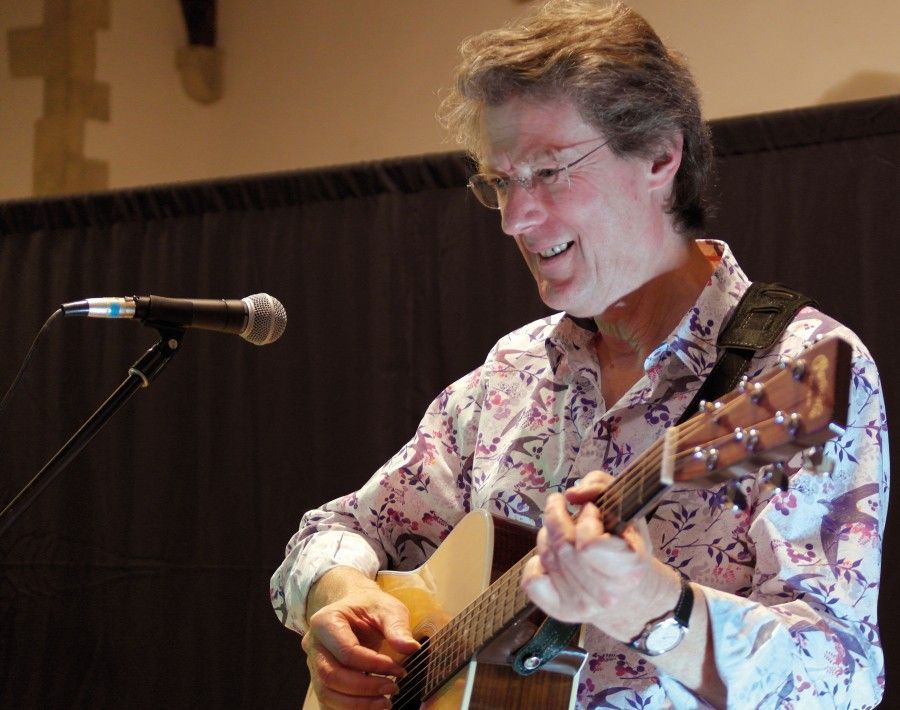Bryn Haworth was a hit in the 70s. Well, he’s popular again – this time bringing healing peace into prisons. In a Sussex village before a church gig, this “musician’s musician” explained to Clive Price why he could never retire
GUITAR HERO Bryn Haworth feels free in prison. Don’t worry. The well-known singer-songwriter isn’t doing time. He’s been sharing his faith with prisoners – including inmates at Lewes – and finding liberty there.
“It was great,” he said of his visit to Lewes Prison this summer. “There were about 40-50 men. I did a couple of sets and went down really well. There was no amplification, there were just two acoustic guitars.”
This “musician’s musician” – who played for classic 70s artists like Joan Armatrading, Gallagher and Lyle and Gerry Rafferty – now uses his musical skills to sing about spiritual freedom behind bars.
SLIDE GUITAR
A youthful 65, Bryn has been an artist in his own right for a long time. Talking just before a gig at St Margaret’s Church, Angmering, he looks back on a career that’s seen him rubbing shoulders with the likes of Jimi Hendrix and The Moody Blues at such places as London’s “Speakeasy” club.
Back in the 70s, you could go into a record store and soon find an LP crediting Bryn’s superlative slide guitar work. He’s also enjoyed acclaim with his own albums like “Sunny Side Of The Street” on Island Records, “Grand Arrival” on A & M and “The Gap” on Sussex label Kingsway.
These days, like many musicians, he releases his own recordings and arranges his own concerts. Venues range from a village church to a Victorian jail. Interestingly, it’s his more reflective material that’s captivated prisoners.
“Funnily enough, they like the quieter stuff,” said Bryn. “They like ‘What Kind Of Love Is This?’. They love that. There’s so much noise in prison. There’s no peace in those places.
“You’d think you have to be all tough when you go in there. But what you really need is to bring the presence and peace of Jesus into a place like that. And you can do that through songs.”
Supported by Music In Ministry Trust, Bryn has been visiting prisons for more than 20 years: “As a chaplain moves on to another prison, they call you up and say, ‘Can you come up and do something here, we’re doing an Alpha course and we want to gather as many men as we can?’.”
He’s usually accompanied by teams from St George’s Church, Ashtead, where he and wife Sally worship. After his prison performances, Bryn allows time for prayer. “If you feel you need to pray with somebody and they want you to pray, then you should do it straightaway,” he said, “because you don’t get much time.”
They’ve found an openness among the men, and a complete lack of religiosity. “We’ve seen lots of good things happening – like physical healings,” said Bryn. Not surprisingly, the blues has been described as “healing music” by another guitarist, Robert Cray.
“It’s a bit like when you hear of people going to Africa and they see people getting healed all the time, you think, ‘Why doesn’t it happen here?’,” said Bryn. “It’s a bit like that in prison. It’s like going to another country because you see a lot more activity of the presence of God in a prison.”
Bryn claims he’s seen people recover from liver disease. One inmate at High Down Prison, Surrey, was so unwell, he’d been booked for a scan. Bryn prayed for his healing. When Bryn returned to High Down at a later date, the same man was there, claiming there was no longer any trace of liver disease.
SUSSEX PREACHER
Although he’s originally from Lancashire, it was in Sussex where Bryn had his first real taste of spiritual freedom. He and Sally were living at a cottage near Heathfield in 1974. One day they went for a drive to Eastbourne and came across a huge tent in a field. They stopped, thinking it was a circus. It was actually an evangelistic crusade by Sussex preacher Dick Saunders.
“We sat at the back because we’d never been to anything like this before,” Bryn remembered. “I just didn’t understand what he was talking about, really. It was a different language to me, because I didn’t have that Christian background.”
However, Bryn couldn’t avoid reading the huge banner over the stage that boldly declared Christ’s words, “I am the way, the truth and the life”. Bryn realised he’d tried his own way for 26 years and it wasn’t working. As the meeting closed, enquirers were invited to “go forward” in traditional evangelistic fashion.
Sally stood up, encouraging Bryn to follow. “I was so gripped with fear, I couldn’t let go of the chair and couldn’t let go of her hand,” he recalled. “She started running down to the front of the tent. So my wife, I, and the chair went down to the front. It was just so embarrassing!”
But as Bryn left the tent, he knew God was real. The incident is documented in his song “More Than A Tent”. Now he continues to share his story wherever that takes him – in prisons, churches, concert halls and recording studios.
So what does the future hold?
“How many years you have left, you don’t know,” he reflected. “You want them to be as effective and as useful as possible in kingdom terms, because there’s nothing else.
“I could never go and retire somewhere. I’ve seen so many people who have, and it’s done them no good. Especially as a Christian, I’d love to keep working. As long as I can physically stand up and play and sing, I’ll do it. And if it’s still good, fantastic!”
Clive Price is a media consultant to companies and charities. He wrote the promotional material for some of Bryn’s earlier albums, and has followed Bryn’s career since the 70s.


